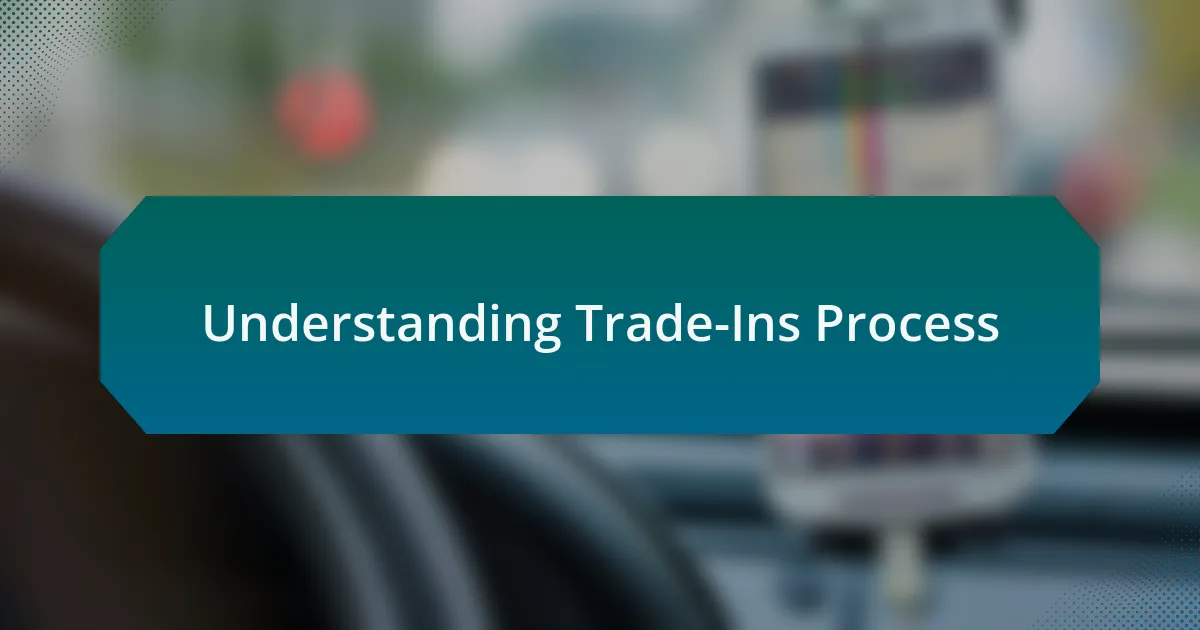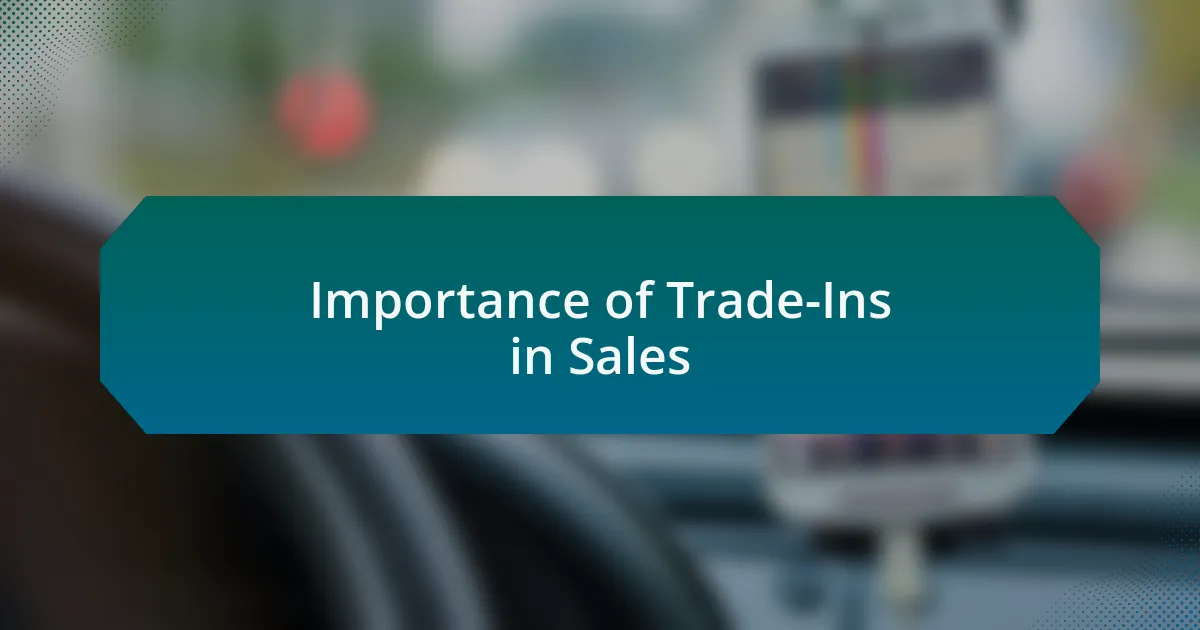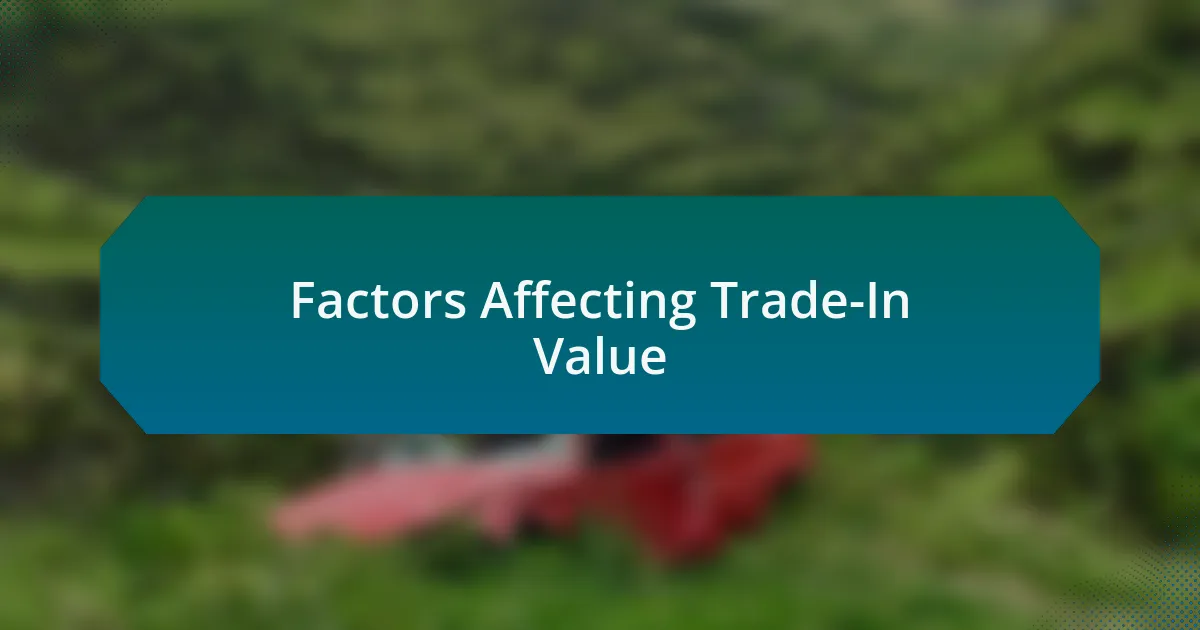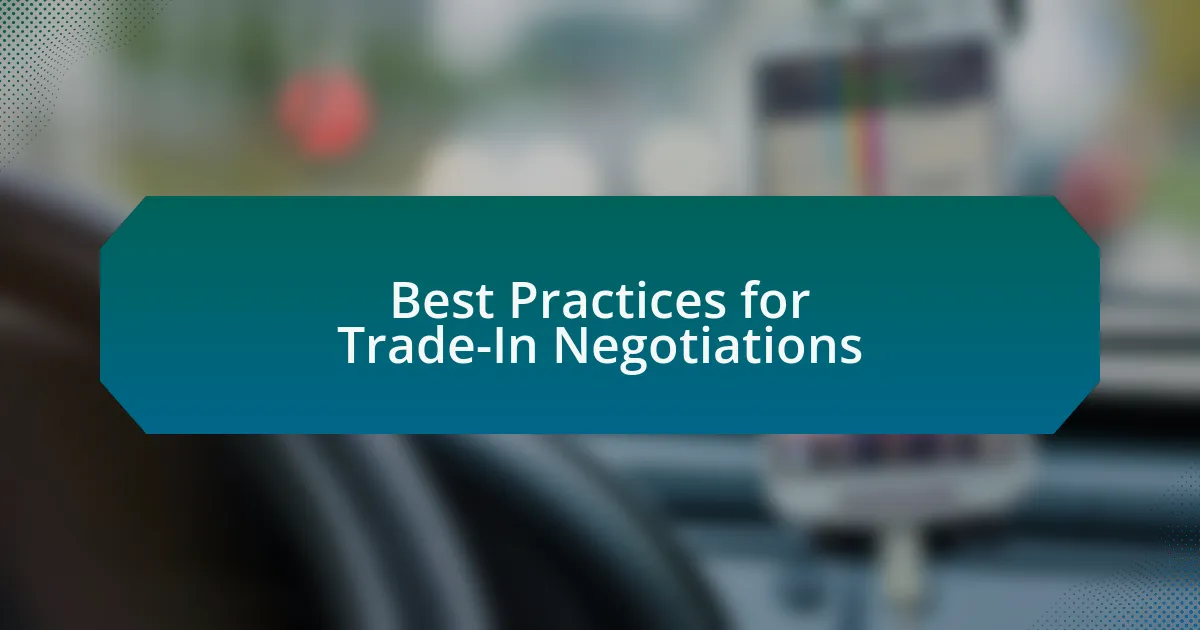Key takeaways:
- Research your vehicle’s market value and condition prior to visiting the dealership to facilitate better negotiations.
- Timing and seasonality can greatly influence trade-in offers and negotiations, making it essential to choose the right moment.
- Being honest about your vehicle’s condition fosters transparency and can improve the negotiation process.
- Consider potential tax benefits from trade-ins as they can significantly impact overall purchase costs when upgrading to a new vehicle.

Understanding Trade-Ins Process
Navigating the trade-in process can sometimes feel overwhelming, especially if you’re not familiar with how it all works. I remember the first time I traded in my car; I was nervous and unsure of how to evaluate my vehicle’s worth. It’s essential to research its market value before even stepping into the dealership. Having an understanding of your car’s condition and the fair price range can significantly ease the negotiation process.
As you prepare for your trade-in, consider how the dealership will assess your car. They typically check for things like mileage, overall condition, and any mechanical issues. When I brought my car in, I was pleasantly surprised by how much attention they paid to minor details, which made me realize how important it is to maintain your vehicle well. Have you ever wondered why a well-kept car can fetch a better price? Taking the time to clean and fix minor issues can genuinely enhance your trade-in value.
Lastly, don’t forget to think about your new car purchase while negotiating your trade-in. I’ve learned that some dealerships may offer you a better deal on your trade-in if you’re also buying a luxury vehicle from them. It’s all about leverage. Have you considered how that might play into your next buy? Understanding the dynamics of both sales can lead you to a more advantageous trade-in experience.

Importance of Trade-Ins in Sales
When I reflect on my experience with trade-ins, I realize they can significantly influence the overall sales process. Think about it: a well-structured trade-in can not only bolster your purchasing power but also simplify the buying experience. The more I delved into this, the more I understood how trade-ins serve as a bridge, connecting the sale of my old car to the excitement of acquiring a luxury vehicle.
The emotional component of trade-ins often gets overlooked. I vividly remember the mix of nostalgia and anticipation as I let go of my previous car, which had accompanied me through numerous milestones. I found that many buyers share that sentiment, and acknowledging it can create a more relatable conversation at the dealership. Have you considered how your attachment to your vehicle could impact negotiations? Acknowledging these feelings can empower you during discussions about your trade-in value.
Lastly, it’s essential to recognize that trade-ins can enhance the dealer’s bottom line, which can translate to better deals for you. By optimizing their inventory through high-quality trade-ins, dealerships are often willing to offer incentives that benefit both parties. I’ve seen this play out firsthand; when I traded in my vehicle, the dealership was keen to make me a competitive offer that ultimately made the sale worthwhile. It’s a mutually beneficial relationship that thrives on understanding and trust.

Factors Affecting Trade-In Value
When I think about what determines trade-in value, I often recall a few key elements. The vehicle’s condition is paramount; a well-maintained car, free from significant wear and tear, certainly draws a higher offer. During my last experience, the dealer pointed out minor scratches, which I had overlooked, ultimately affecting my trade-in significantly. Have you ever considered how a little professional detailing might elevate your car’s perceived value?
Another major factor is the demand for your make and model. I was surprised to learn that certain luxury brands hold their value better than others simply due to popularity. When I traded in my SUV, I had no idea that the car was a hot commodity at the time. It made my trade-in negotiations much smoother than I anticipated.
Mileage also plays a critical role in determining trade-in value. Lower mileage often translates to higher offers, as it signals less wear and tear. When I was preparing my car for trade-in, I realized all those road trips added up, and I had to adjust my expectations accordingly. Have you checked how your car’s mileage stacks up against others in the market? It can be a revelation that influences your strategy.

Best Practices for Trade-In Negotiations
When it comes to trade-in negotiations, timing can be everything. I remember visiting my local dealership during a busy sales month, which created a competitive atmosphere. The dealer was eager to make deals, and that urgency worked in my favor. Have you ever noticed how the season can influence car sales? I certainly have, and it can be a game-changer in negotiations.
Preparation is crucial, too. Before heading to the dealership, I did my homework by researching my car’s market value and checking online tools for trade-in estimates. This enabled me to walk into the negotiation table with confidence. It raises a critical point: are you equipped with the knowledge needed to negotiate well? Without this insight, you might leave money on the table.
Another effective strategy is being willing to walk away. There was a moment during my last negotiation where I felt the offer was too low. Instead of accepting it, I calmly expressed my dissatisfaction and hinted at exploring other options. That simple action made a difference in the final offer. Have you considered that sometimes, showing reluctance can empower your negotiation position? It certainly did for me.

Common Mistakes to Avoid
It’s easy to get caught up in the excitement of a new car, but one common mistake I often see is neglecting to thoroughly inspect the trade-in vehicle before the deal. I once overlooked a minor dent on my car, thinking it wouldn’t matter. However, that little detail came back to haunt me when the dealer used it as leverage to reduce my offer significantly. Have you considered how even small imperfections can impact your trade-in value?
Another pitfall is failing to disclose issues with your vehicle. I learned this the hard way when I hesitated to mention a minor engine noise, hoping it would go unnoticed. Instead, the inspection brought it to light, and I lost trust in the negotiation process. Be honest about your car’s condition—it’s not just about achieving a higher trade-in value, but also about fostering a transparent relationship with the dealer. How do you think honesty could shift the dynamics of your negotiations?
Lastly, overlooking the potential tax benefits can be a costly mistake. I remember when trading in my luxury sedan; I didn’t initially consider how the trade-in value could offset the purchase price for tax calculations. This realization saved me quite a bit. Have you factored in how a smart trade-in can influence your overall cost when upgrading? Knowing this can transform your trading experience from merely transactional to financially advantageous.

Personal Experiences with Trade-Ins
I vividly recall my first trade-in experience. I was excited but also nervous; I didn’t quite understand how the process worked. The dealer’s enthusiasm was infectious, but when I saw the final offer, I felt a mix of disappointment and confusion. They pointed out flaws I hadn’t even considered, leaving me wondering if my perception of value was completely off. Have you ever faced a similar experience where your expectations clashed with reality?
When I was trading in my SUV, I took a moment to reflect on how much I loved that vehicle. It had been my companion for road trips and adventures, and letting it go felt emotional. Yet, when the dealer acknowledged its condition and offered a decent price, I realized the importance of valuing my memories while also being pragmatic about the trade-in’s potential. Does emotional attachment complicate your decision-making when it comes to trading in a vehicle?
One lesson I learned the hard way was the significance of timing during trade-ins. I traded my car just before new models arrived, and that decision cost me. The dealer had less incentive to offer a better deal since they were about to be flooded with fresh inventory. It was a valuable lesson about market dynamics; have you thought about how timing could affect your trade-in experience? Knowing when to trade can truly shape the outcome in your favor.